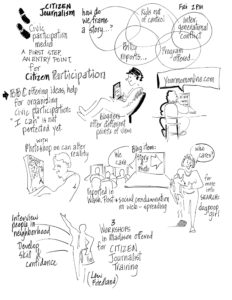Convener: Eric Nelson & Linda Grdina
Participants: Dan, Sue Ellen, Jan, Jean, Lew, Stephen, Dale
Discussion
Questions:
What is required to pilot a dialogic and deliberative from of citizen journalism?
How does new media build and sustain community?
How does citizen journalism prompt community action?
Discussion Notes
There are thousands of citizen journalism experiments in progress in the U.S..
Therefore we need to track what is being learned and use this to develop new models.
Everyday citizens state that no one in mainstream media is covering the issues of
the common person on the street and want a mechanism for share and learning about
this news.
What do we mean by the word community that is used in the questions for this
conversation? There are many sub-communities but is there one community?
How do we really know if citizens want citizen journalist?
Anecdotal evidence shows the citizen journalism has increase citizen engagement on
issues, facilitates development of new social networks, and supports two-way
communication between citizens both on-line and face-to-face.
Editors can provide a critical role in maintaining credibility and quality of
citizen submitted stories but does this homogenize the approach to reporting.
It is important to monitor what is emerging naturally from various social networks
and how they are using processes and technologies to support and grow their
networks. Based on what is emerging, new models of citizen journalism we could
development.
Citizen journalists will their stories in unique ways that are unlikely to replicate
tradition journalism styles. The web and it capacity for linking and two-way
communication will form citizen journalism in unique ways.
Citizen journalism increases citizen involvement and understanding of the complexity
of issues, even if people are reporting from an advocacy position.
What is the role of the citizen journalist in convening or facilitation public
discourse?
Will citizen media become a new form of civic engagement?
Can there be a role for journalist and new organization to create the
container/infrastructure to enables citizens to share concerns, tap critical
information, and solicit public discourse on areas of interest, concern, hope? What
would such an infrastructure look like and who would maintain it?
How do social networks use computer networks?
Is it possible to support online discussion between advocacy groups?
J-Lab grant to Madison. Using a web site, they’ll form a broader common space for
community discussion, informed by reporting, not blogging. They did an open call for
“journalism 101” workshops ($35/workshop) to train people to be citizen
journalists. Issues they focus on will bubble up from reporter interaction in the
community, not online forums. Phase two or three of this work will include convening
community conversations.
Once you train citizens to be journalists do you homogenize their approach to
reporting?
There are models, like J-Lab, that create entry points from citizen journalism and
other models that wait for entry points to emerge organically. This area is still
forming; it’s too early to evaluate the impact of citizen journalism.
Book: Smart Mobs, Howard Rheingold
Web Sites: BBC Act Now – provides tools for people to take action and informs
journalists about what people are interested in so they can cover those topics/areas
of interest.
